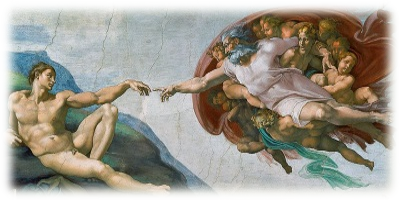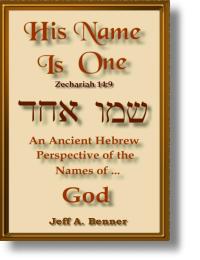Genesis 1:27
And God created man in his own image
God (Strong's #430)
The Hebrew word אלהים (elohiym) is the plural form of אלוה (elo'ah) literally meaning "strength" and "power" and is usually translated as God or god. The ים (iym) is the masculine plural suffix and when added to this word becomes אלהים (elohiym) which is usually translated as gods or judges as they are strong and powerful ones. But it is also commonly used for God as a name because he is "thee" strong and powerful one.
Create (Strong's #1254)
The Hebrew word behind created is the Hebrew verb ברא (bara). The idea of "creating" is an abstract thought that is foreign to Hebrew thought. The concrete understanding behind this word can be seen in 1 Samuel 2:29, "Why do you honor your sons more than me by fattening yourselves on the choice parts of every offering made by my people Israel?" In this passage is the word "fattening" which is the same Hebrew verb ברא (bara). By extension this word also means to "fill up."
Man (Strong's #120)
The Hebrew word for man is אדם (adam) and is also the name of the first man.
Image (Strong's #6754)
The word צלם (tselem) is literally a shadow which is the outline or representation of the original.
And Elohiym, the Great Powerful One, filled the man with a representation of himself.
When we read "And God created man in his own image" our minds form a mental picture of what we look like and then attribute this picture to God himself. In the Hebrews mind it is not the appearance of something that they concentrate on but its function. This passage is not implying a picture of man or God but their function. Through the Hebrew words of this text, we see that God had placed within man a shadow or representation of his own function - goal, purpose, thought, etc. It is our responsibility to live our lives as representatives of God, acting in the same manner as he would.
Exodus 20:7
You shall not take the name of the LORD your God in vain
Take (Strong's #5375)
The Hebrew verb behind this English word is נשא (nasa) and is a very generic verb used in a wide variety of ways in the text. This word has been translated as lift, carry, accept, exalt, regard, obtain, respect and many other ways. In the context of this verse, it is the "name" that is being "lifted up." One lifts up a name by making it known to others.
Name (Strong's #8034)
In our modern western cultur, a name is nothing more than an identifier, really no different than being assigned a number. The Hebrew word for a name is שם (shem) But, in the Ancient Hebrews culture the "shem" is much more than just a name it is the "breath" of the individual. To the Hebrews the breath is more than just the exchange of air in the lungs it is his "character," the internal qualities of an individual that make him unique. This idea of the word shem meaning character can be seen in 1 Kings 4:31, "and his fame was in all the nations round about." Here, the word fame is understood as his "character."
All Hebrew names are words with meaning and these words reflects their characters. For instance, Eve (Hhavah in Hebrew) means "life" because she is the mother of all the living (Hhay, a related word to Hhavah, see Genesis 3:20). The names for God are no different. The name Yahweh means "he exists" and God (Elohiym) means "one of power and authority." Some other names of God include "Jealous" (Exodus 34:14), "One" (Zechariah 14:9 which literally reads "his name is one"), Holy (Isaiah 57:15) and others. What is God's name? Most will answer with Yahweh or God but we must remember that a name or shem in Hebrew is the character of the individual so the correct question should be "What is God's character?"
Vain (Strong's #7723)
The third word that we need to understand correctly is the word "vain." This is the Hebrew word שוא (sheva). This word literally means "empty" and vain actions are empty of substance. This word can also be understood as "falsely" in the sense of being empty of its true substance. This idea can be seen in Exodus 23:1, "You shall not utter a false report." The word "false" is the very same Hebrew word שוא (sheva).
Now that we have a more complete understanding of the words in the passage, we are able to make a more Hebraic interpretation.
You shall not represent the character of Elohiym Falsely.
So, what does this mean? In Genesis 1:27 we saw that when it says "God created man in his own image" it is in fact saying that God had placed within us a representation of himself. This representation is his shem or character and we are to show this character to others. If however, we represent that character falsely, in other words live our lives contrary to the character of God, then we are violating this command. In the next passage we will take a closer look at what it means to be "filled with the image of God."
Exodus 31:3
And I have filled him with the spirit of God, in wisdom, and in understanding, and in knowledge, and in all manner of workmanship
Wisdom ( Strong's #2451)
The verbal root for this word is חכם (hhakham) and means to separate between good and bad, right and wrong, left and right, up and down, etc. This is often used in the context of a skilled workman as in Exodus 28:3, "And thou shalt speak unto all that are wise (hhakham) hearted, whom I have filled with the spirit of wisdom, that they may make Aaron's garments to consecrate him, that he may minister unto me in the priest's office." These workmen are filled with the spirit of "wisdom" which is in the Hebrew חכמה (hhakhmah), the noun form of the verb חכם (hhakham). A person with wisdom is one who has the ability to separate between good and bad, right and wrong, left and right, up and down, etc.
Understanding (Strong's #8394)
The Hebrew word for understanding is תבון (tavun) comes from the verbal root בין (biyn) meaning to "understand" but the deeper meaning of this word can be found in a related verbal root - בנה (banah) which means to "build." In order to build or construct something one must have the ability to plan and understand the processes needed. This is the idea behind the verb בין (biyn) and its derivative noun תבון (tavun), to be able to discern the processes of construction.
Knowledge ( Strong's #1847)
The Hebrew word for knowledge is דעת (da'at), a noun derived from the verb ידע (yada) meaning "to know." The idea of "knowing" in Ancient Hebrew thought is similar to our understanding of knowing but is more personal and intimate. We may say that we "know" someone but simply mean we "know" of his or her existence but, in Hebrew thought one can only "know" someone if they have a personal and intimate relationship. In Genesis 18:19 God says about Abraham "I know him" meaning he has a very close relationship with Abraham. In Genesis 4:1 it says that Adam "knew Eve his wife" implying a very intimate sexual relationship. Knowledge is the intimate ability to perform a specific task or function.
With the more in-depth meaning behind these three words, we can better understand Exodus 31:3 as follows;
And I have filled him with the spirit of God, with the ability to distinguish between the good and the bad, and with the ability to discern the processes of construction, and with an intimate ability to perform the tasks, and in all manner of workmanship.







